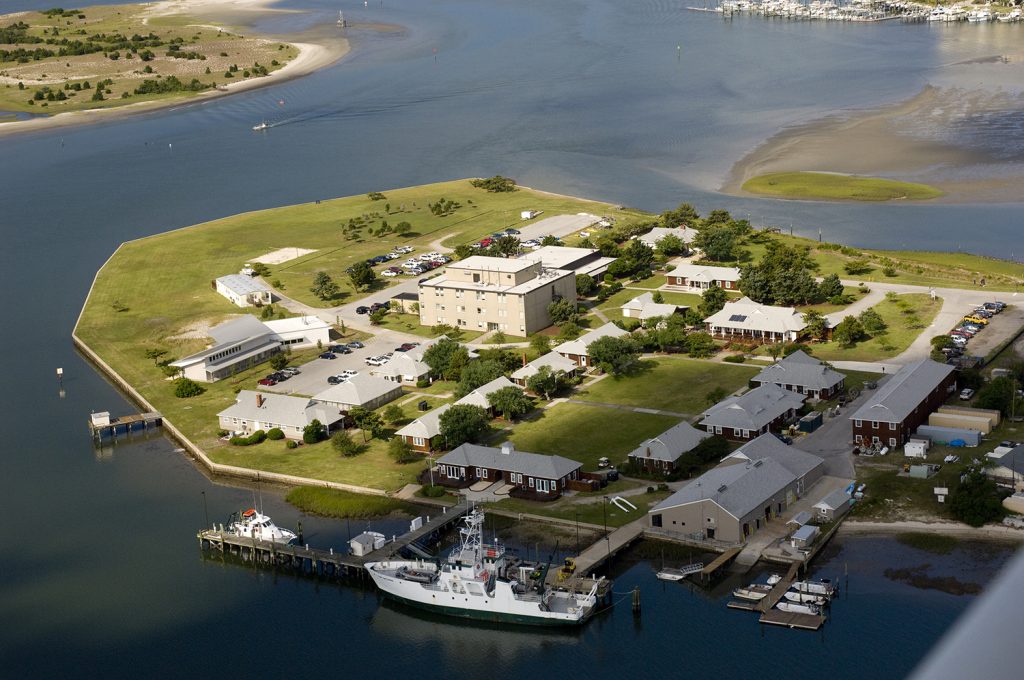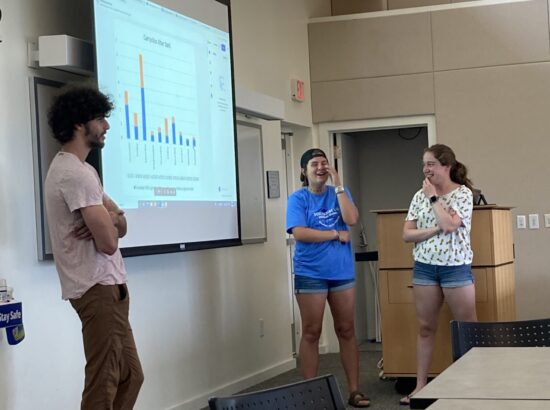
Overview
DukeEngage’s Conservation and Community program supports organizations in rural, coastal NC with education and conservation missions that deal with the socio-economic realities of climate change on the coast. Realities such as increased storms, collapsing fisheries, sunny-day flooding, shoreline erosion, changing economies, habitat degradation, sea level rise, and more.
Students in this program will work with the Community Science Initiative (CSI) at the Duke Marine Lab, an initiative that collaborates with our community through education, outreach, and local research. By working with the CSI’s community partners, students will work with trusted community groups and contribute to their on-going environmental, educational, and conservation projects. Support for these organizations can come in many forms and may include activities such as: hands-on restoration, developing curriculum, running education programs, recording and analyzing data, evaluating programs, creating online/social media content, writing and designing manuals/policy briefs, updating websites, designing software, volunteering with youth organizations, and more. For example, students may work on living shoreline restoration plans, water quality projects, assist with environmental education programs to create opportunities for rural students, conduct background writing/research for conservation programs, and work with non-profit groups to assist rural communities with changes related to sea level rise. Students will recognize the complex nature of how sea level rise and global climate change affects NC’s coastal communities, learn about the unique set of issues that rural non-profits face, and help those non-profits on a variety of projects.
Community Partnerships
Potential partners and projects are listed below. We will do our best to match you with your preferred community partner, but because we work with ever-changing community needs, students must be willing to work with all partners.
- Marine Lab Community Science Initiative: connecting research to outreach programming, creating citizen science projects, working on resilience projects, assisting with content development and delivery, mentoring high school student scientists, and supporting arts and science collaborations.
- NC Coastal Federation: installing living shoreline restoration projects.
- Wildlife Resource Commission (WRC): helping with sea turtle conservation, collating and processing sea turtle data through various databases, including sea turtle nesting data, sea turtle stranding data, diamondback terrapin occurrence data, etc.
- Core Sound Museum: creating program content about sea level change and coastal resiliency, and assisting with their environmental education exhibits and programs.
- Carteret County Public Schools: developing programming and academic support for rural schools in Carteret County.
- Coastal Carolina Riverwatch: collecting water quality samples, helping with data analysis and translation, assisting with water quality programming.
- Rachel Carson Ecological Research Reserve: organizing historical and current natural heritage records and ecological data.
- Local governments: creating programs, educational materials, and policies to improve conservation and education options within their communities.
- Cape Lookout National Seashore: assisting with park maintenance, visitor experience, conservation projects, and/or education programs.
Program Requirements
Skills: GIS, Excel, writing, and website development skills are useful but not necessary. Willingness to learn new skills.
Personal Qualities: Willingness to be part of team and work in partnership with our community. Also there will be field work – so the ability to be comfortable outside in coastal NC summer heat and humidity is a must.
Logistics
Housing, meals, and transportation: Housing and meals will be at the Duke University Marine Lab dormitory and cafeteria. During the academic year, students with SDAO accommodations for a single room can typically be met; however, due to limited bed availability during the summer months, we are unable to guarantee single room accommodations. Room availability may vary based on demand, and we appreciate your understanding and flexibility. Students must be prepared to share rooms and may be in doubles, triples and quad rooms.
Transportation to community projects will be covered by the program via van or public buses.
Local safety, security, and cultural norms: If you have special needs related to health, culture, disability, or religious practices, we encourage you to contact the program director(s) or the DukeEngage office to discuss whether your needs can be accommodated in this program.
For guidance on how race, religion, sexual/gender identity, ability, or other aspects of identity might impact your travels, we suggest exploring the Diversity, Identity and Global Travel section of the DukeEngage website.
Academic Connections
This program is open to all, and might especially appeal to students taking courses in the Nicholas School of the Environment, Biology, Education, Climate Initiative, and Public Policy.
Students who participate in this program might go on to pursue certificates in community-based management, be interested in service learning courses, taking courses at the Nicholas School of the Environment, engaging with Duke’s Climate Initiative, spending a semester at Duke’s Marine Lab, or connecting their DukeEngage project to independent research.
DukeEngage cannot guarantee that any program will occur. Dates and program details are subject to change, and programs may be cancelled for various reasons, including geopolitical or public health issues.
Related Links
Find out more about the Community Science Initiative here.
Check out these articles that highlight some of the Community Science Initiative projects that past DukeEngage students have worked on:
Reflections from 2022
-

Building social resiliency through story-telling
Published by Tommy KlugThe COVID-19 pandemic was isolating for many, including kids who lost opportunities for social interaction and development. To address this …Read more





